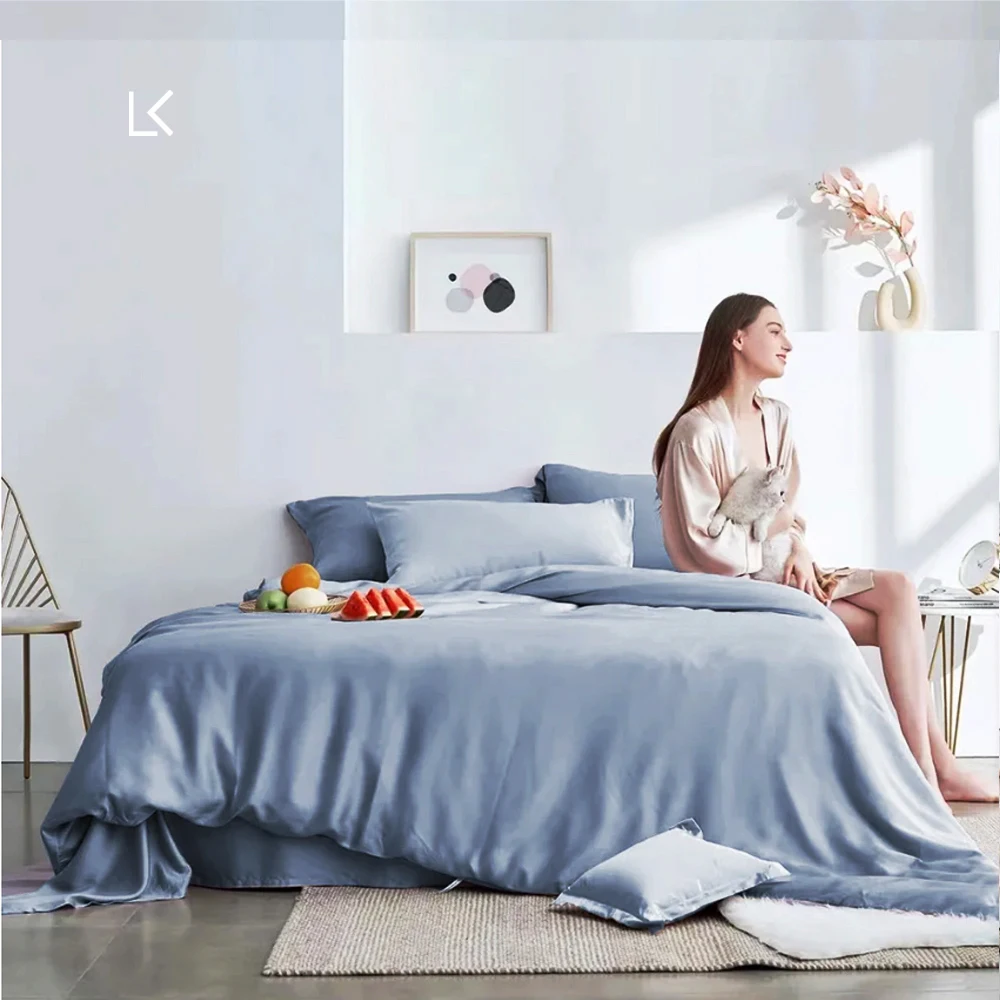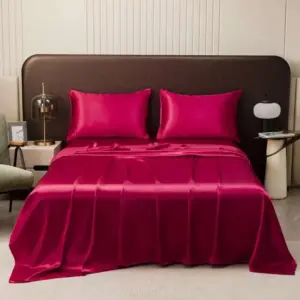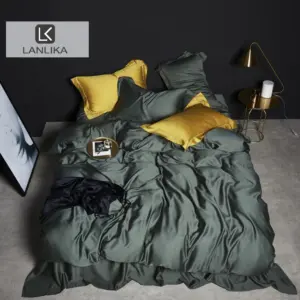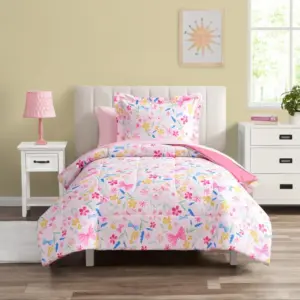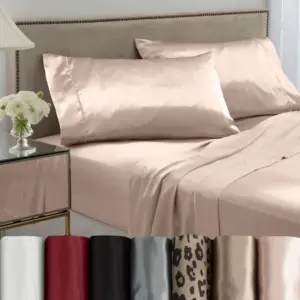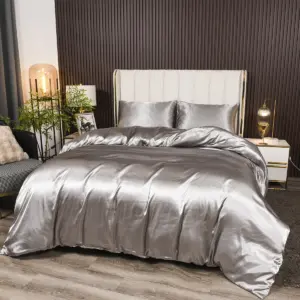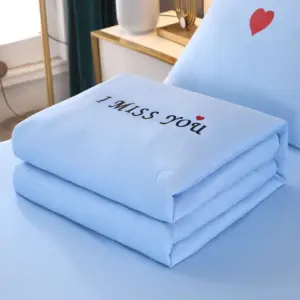Introduction: Thread Count vs. Momme Weight for Silk Sheets
When shopping for bedding, most people have heard that higher thread count means better quality. While this rule of thumb works for cotton sheets, it’s actually misleading when it comes to silk. Many consumers don’t realize that the quality indicators for silk sheets are fundamentally different from those used for other fabrics.
The confusion stems from the unique nature of silk fibers. Unlike cotton, which has thicker, more uniform threads that can be easily counted, silk fibers are extremely fine and delicate. This makes traditional thread count measurements far less meaningful for silk fabrics.
Enter momme weight – the true quality indicator for silk sheets. Momme (pronounced “moe-mee”) is a weight measurement specifically developed for silk, equaling 4.340 grams per square meter of fabric. This measurement tells you how much silk was actually used to create your bedding, directly indicating its density, durability, and luxury feel.
Understanding the difference between these quality metrics isn’t just academic knowledge – it can save you from expensive mistakes when investing in silk sheets. Many retailers rely on consumers’ familiarity with thread count to market their products, sometimes making misleading claims about silk quality.
In this comprehensive guide, we’ll explore why momme weight should be your primary consideration when purchasing silk sheets, what specific weights mean for performance and comfort, and how to identify truly premium silk bedding worth your investment.
Why Thread Count Is Irrelevant for Silk Fabrics
Thread count has become the go-to metric for judging cotton sheet quality, but applying this same measurement to silk creates fundamental problems that can mislead consumers.
The Structure of Silk Makes Thread Counting Impractical
Silk fibers are extraordinarily fine – about 1/5 the diameter of a human hair. A single silk thread is actually composed of multiple filaments bundled together, making consistent counting nearly impossible. The natural variation in silk thread thickness further complicates attempts to standardize thread counts across different products.
Additionally, silk’s production process differs significantly from cotton. While cotton sheets are woven from multiple individual threads, silk sheets are typically created from continuous filaments that can be up to 1,000 meters long. This fundamental difference in construction makes thread count a poor indicator of silk quality.
Marketing Manipulation and Consumer Confusion
Unfortunately, some manufacturers exploit consumers’ familiarity with thread count by:
- Artificially inflating thread counts for silk products
- Using misleading language like “equivalent thread count”
- Failing to mention that high thread counts occur naturally in silk due to the fiber’s fineness
- Creating confusion by mixing different quality metrics
These marketing tactics take advantage of consumers who naturally assume that the quality indicators for cotton bedding apply equally to silk. Many buyers end up paying premium prices for silk sheets based on impressive-sounding thread counts, when those numbers actually reveal little about the product’s true quality.
“I paid $300 for ‘1,000 thread count’ silk sheets that started falling apart after just three washes,” reports one consumer who learned this lesson the hard way. The reality is that even basic mulberry silk sheets naturally have high thread counts because of silk’s inherent properties.
When shopping for 100% silk sheets, focusing on thread count often leads consumers to overlook the factors that genuinely determine silk quality – most importantly, the momme weight of the fabric.
Understanding Momme Weight: The True Measure of Silk Quality
Momme weight (abbreviated as “mm”) is the gold standard for measuring silk quality, offering a precise assessment of the fabric’s density and durability. This measurement originated in Japan, where silk production has been a revered art for centuries.
What Exactly Is Momme Weight?
Momme weight specifically measures how much 100 square yards of silk fabric weighs in pounds. For practical purposes, you can think of it as the density of the silk – literally how much silk material is present in a given area. The definition translates to 4.340 grams per square meter of fabric in metric terms.
Unlike the subjective or easily manipulated thread count, momme weight provides an objective measurement that directly correlates with several important qualities of silk fabric:
- Higher momme weight = more silk material used
- More silk material = greater durability and longevity
- Greater density = enhanced opacity and richer appearance
- More substantial weight = improved draping and feel against skin
The scientific basis for using weight instead of thread count makes perfect sense when you understand silk’s structure. Since silk threads vary naturally in thickness and composition, measuring the actual amount of silk material provides a far more accurate quality indicator than attempting to count inconsistent threads.
The Significance of Momme Measurements
Momme weight directly impacts nearly every aspect of how silk sheets perform and feel. A fabric with higher momme weight contains more silk, which translates to:
- Greater structural integrity and resistance to wear
- Enhanced ability to maintain shape after washing
- Improved insulation properties
- More substantial hand-feel and luxurious drape
- Reduced translucency
Understanding silk momme weight gives you a reliable method to compare different silk products objectively. Two seemingly identical white silk sheet sets might feel dramatically different if one is 19 momme and the other is 25 momme.
As you continue your exploration of silk bedding options, remember that momme weight serves as the foundation for assessing whether mulberry silk sheets are good quality and worth your investment. The higher the momme weight (within appropriate ranges for bedding), the more actual silk you’re getting for your money.
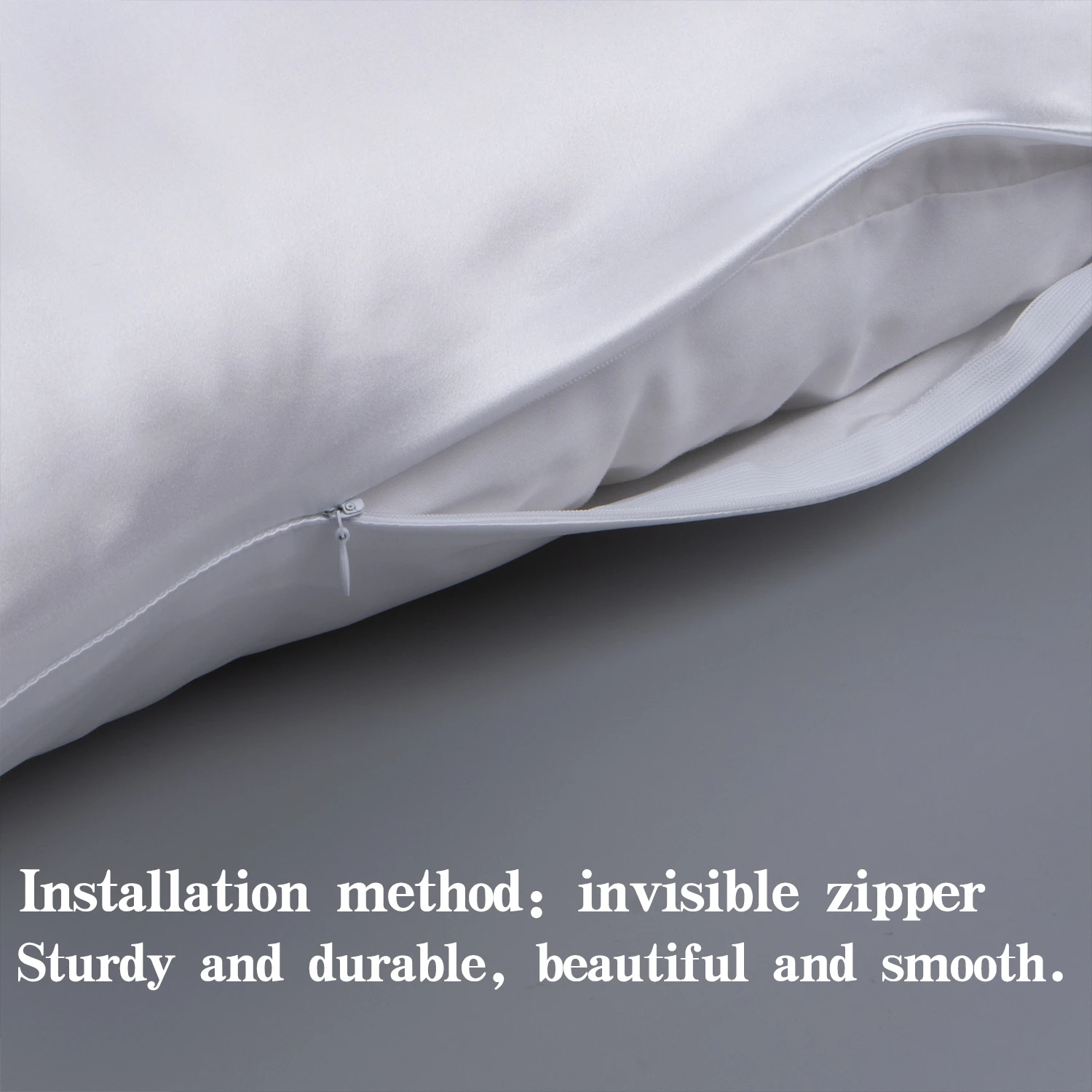
How Momme Weight Affects Silk Sheet Performance
The momme weight of silk sheets doesn’t just represent a technical specification – it directly affects your everyday experience with the bedding. Understanding these performance differences helps you make an informed choice based on your personal preferences and needs.
Key Performance Attributes by Momme Weight
| Performance Attribute | Lower Momme (16-19) | Medium Momme (22) | Higher Momme (25-30) |
|---|---|---|---|
| Durability | 2-3 years with careful use | 3-5 years with proper care | 5+ years with standard care |
| Opacity | Semi-translucent | Minimal transparency | Fully opaque |
| Feel against skin | Lightweight, very breathable | Balanced weight, silky smooth | Substantial, luxuriously heavy |
| Temperature regulation | Excellent cooling, less insulation | Good year-round performance | Better insulation, still breathable |
| Wrinkle resistance | More prone to wrinkles | Moderate wrinkle resistance | Best wrinkle resistance |
| Price point | Entry-level luxury | Mid-range premium | High-end luxury |
When comparing sheets of different weights, the differences become immediately apparent. A 19-momme silk pillowcase feels noticeably lighter and more delicate than a 25-momme version, even if both are made from the same grade of silk.
The physical properties that change with increased momme weight include:
- Thickness of the fabric
- Amount of light that passes through the material
- How quickly the fabric responds to temperature changes
- Resistance to pulling or snagging
- Weight of the sheets on your body
For many sleepers, these differences significantly impact their sleep quality. Someone who tends to sleep hot might prefer the lighter weight of 19-momme sheets, while someone seeking durability might opt for mulberry silk sheets in a higher momme weight.
Interestingly, higher momme doesn’t always mean better for everyone. Just as some people prefer a lighter down comforter while others want maximum weight, silk sheet preferences vary based on individual needs and sleeping conditions.
Optimal Momme Weight Guide: Choosing the Right Weight for Your Needs
Selecting the ideal momme weight for your silk sheets requires balancing several factors, including your budget, sleeping preferences, and intended use. Most quality silk bedding falls within the 19-30 momme range, with distinct characteristics at different weight points.
16-19 Momme: Light Luxury
Characteristics:
* Lightweight and breathable
* Delicate, ethereal feel
* Semi-transparent appearance
* Most affordable price point for real silk
Best for:
* Hot sleepers who prioritize cooling properties
* Summer bedding in warmer climates
* Those new to silk who want to try it without maximum investment
* Guest rooms or occasional use
Limitations:
* Requires more careful handling during washing
* May show wear more quickly with regular use
* Less insulating during colder months
22 Momme: The Versatile Sweet Spot
Characteristics:
* Balanced weight and feel
* Good opacity while maintaining airflow
* Moderate durability with proper care
* Middle-range price point
Best for:
* Year-round use in most climates
* Primary bedding for everyday use
* Those seeking the best value-to-performance ratio
* Both hot and cold sleepers
Limitations:
* Not as lightweight as lower momme options
* Less durable than heavier weights for long-term use
25-30 Momme: Premium Performance
Characteristics:
* Substantial weight with luxurious drape
* Excellent durability and longevity
* Superior opacity and rich appearance
* Highest price point
Best for:
* Long-term investment in primary bedding
* Cooler sleeping environments
* Those who appreciate heavier, more substantial bedding
* Users willing to pay more for maximum durability
Limitations:
* May feel too heavy for some sleepers
* Less cooling than lighter alternatives
* Highest initial investment cost
Climate Considerations
Your local climate should influence your momme weight selection:
- Hot, humid climates: Lower momme weights (16-19) maximize cooling properties
- Moderate climates: Mid-range weights (22) offer versatility year-round
- Cooler climates: Higher momme weights (25-30) provide better insulation
Value Assessment
When comparing prices across different weights, consider the cost per year of use rather than just the initial price tag. For example:
- 19 momme sheets at $250 with 3-year lifespan = $83/year
- 25 momme sheets at $400 with 7-year lifespan = $57/year
In this example, the higher initial investment actually provides better long-term value. The comprehensive silk momme weight guide can help you make the most informed decision based on your specific needs.
Those looking for options across different weight categories can explore our collection of luxury silk bedding sets featuring various momme weights to suit different preferences.
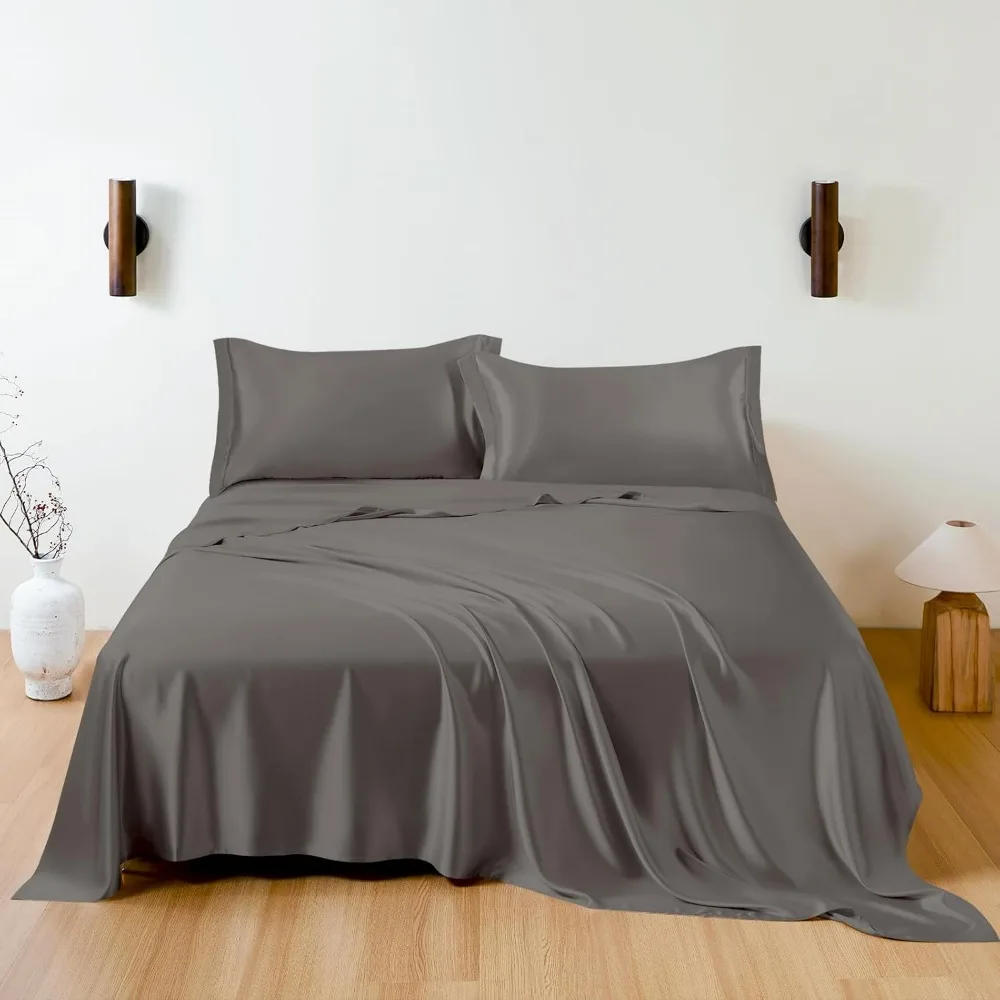
Beyond Momme: Other Critical Quality Factors for Silk Sheets
While momme weight is the primary quality indicator for silk sheets, several other factors work together to determine the overall quality and performance of silk bedding.
Types of Silk: Why Mulberry Reigns Supreme
Not all silk is created equal. The source of silk significantly impacts its quality, with mulberry silk widely recognized as the superior choice for bedding:
Mulberry Silk
* Produced by silkworms fed exclusively on mulberry leaves
* Characterized by long, uniform fibers with minimal variation
* Naturally white with excellent dye absorption for consistent coloring
* Hypoallergenic properties ideal for bedding
Other Silk Varieties
* Tussar/Tussah: Produced by wild silkworms, features shorter fibers and a textured feel
* Eri: Shorter staple length, less durable, often mixed with other fibers
* Spider Silk: Extremely rare, not commercially viable for bedding
What makes mulberry silk special is its unique combination of strength, smoothness, and uniformity. These characteristics make it the preferred choice for high-quality bedding, offering the best balance of comfort and durability.
The Silk Grade System Explained
Beyond the type of silk, manufacturers use a grading system to indicate fiber quality:
Grade A: Basic quality suitable for silk products
Grade 2A: Good quality with minor inconsistencies
Grade 3A: Very good quality with few imperfections
Grade 4A: Excellent quality with minimal imperfections
Grade 5A: Superior quality with virtually no imperfections
Grade 6A: The highest possible quality, representing perfect uniformity
The grade reflects several factors:
* Fiber length (longer is better)
* Consistency in thickness
* Uniformity of color
* Percentage of imperfections
Higher grades command premium prices because they require more selective harvesting and processing of cocoons.
Weave Types and Their Impact
The weaving technique significantly influences how silk sheets feel and perform:
Charmeuse Weave
* The standard for luxury silk bedding
* Creates a smooth, glossy front surface with a matte back
* Offers the classic “slippery” silk feel most people expect
Habotai Weave
* Lighter weight plain weave
* Less durable than charmeuse
* Often used in less expensive silk products
Momme weight and weave interact to determine the final fabric properties. For example, a 22-momme charmeuse weave creates a substantially different fabric than a 22-momme habotai weave.
Production Methods and Quality Control
The manufacturing process greatly impacts silk quality:
- Hand reeling versus machine processing
- Temperature and humidity control during production
- Dyeing processes and chemical treatments
- Quality control standards and testing protocols
Look for certification standards like OEKO-TEX Standard 100, which ensures the finished product has been tested for harmful substances.
For a deeper understanding of what goes into quality silk bedding, the complete guide to mulberry silk bed sheets offers valuable insights. Our collection of mulberry silk bedding sets demonstrates how these quality factors come together in premium products.
How to Identify Quality Silk Sheets When Shopping
With so many options on the market and misleading marketing claims abundant, knowing how to identify genuine quality silk sheets is essential. Here’s your practical guide to making informed decisions:
Verification Checklist for Quality Silk
✓ Clear momme weight disclosure – Quality manufacturers proudly display the momme weight, typically between 19-25 momme for bedding.
✓ Fiber content labeling – Look for “100% Mulberry Silk” rather than vague terms like “silk-rich” or “silk-blend.”
✓ Grade specification – Higher-end products will specify the grade (4A, 5A, 6A).
✓ Weave information – Quality silk sheets typically use charmeuse weave for bedding.
✓ Transparent pricing – Quality silk sheets typically cost $300-$700 for a queen set; suspiciously low prices indicate inferior quality.
Red Flags to Watch For
⚠️ Thread count focus – When a product heavily emphasizes thread count but doesn’t mention momme weight.
⚠️ Too-good-to-be-true pricing – Pure silk sheets under $100 for a set almost certainly indicate synthetic blends or extremely low momme weight.
⚠️ Vague terminology – Terms like “silky soft” or “silky feel” often indicate synthetic materials rather than genuine silk.
⚠️ Missing specifications – Quality products clearly state their specifications; if you can’t find details about momme weight or silk type, be suspicious.
Tactile Quality Indicators
When you can physically examine the sheets:
- Sound test – Genuine silk makes a distinctive rustling sound called “scroop” when rubbed together.
- Burn test – If possible, burn a small thread. Real silk smells like burning hair and turns to ash; synthetic silk smells like plastic and melts.
- Texture assessment – High-quality silk feels smooth but not slippery, with a subtle weight that indicates substance.
- Sheen evaluation – Look for a natural, subtle luster rather than a bright, artificial-looking shine.
Questions to Ask Retailers
- “What is the exact momme weight of these sheets?”
- “Is this 100% mulberry silk or a blend?”
- “What grade of silk is used in this product?”
- “How should these sheets be cared for?”
- “What certification standards do these sheets meet?”
Understanding the exceptional benefits of mulberry silk sheets helps you recognize the value in genuine quality products. For comparison, examining complete silk sheet and pillowcase sets can help you identify how these quality factors manifest in finished products.
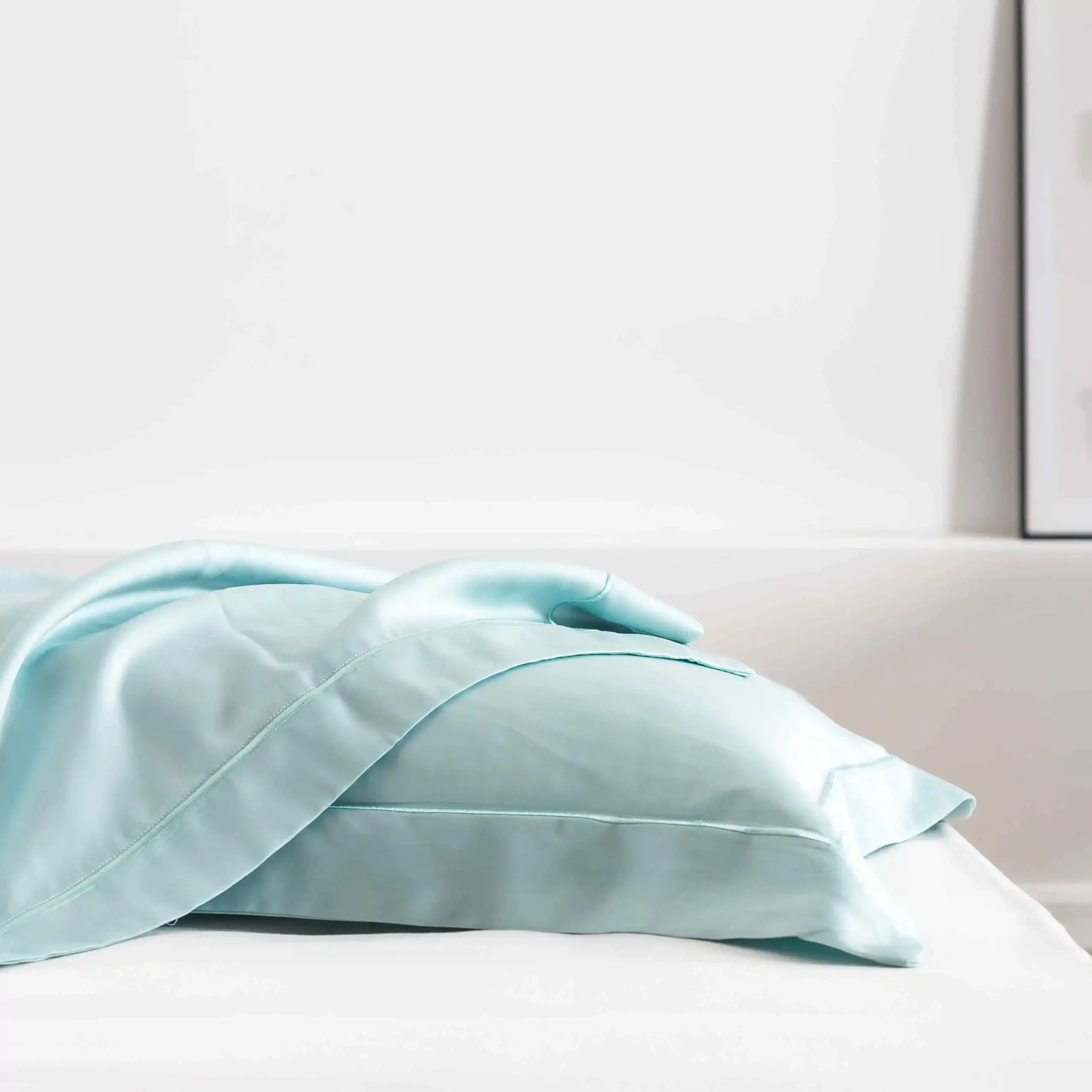
The Benefits of Investing in High-Quality Silk Bedding
When you invest in premium silk sheets with appropriate momme weight, you’re not just buying luxury bedding – you’re investing in your health, comfort, and long-term value. Understanding these benefits helps justify the higher price point compared to conventional bedding.
Skin and Hair Benefits
High-quality silk creates a smooth surface with minimal friction against your skin and hair:
- Reduced sleep creases – Wake up without pillow lines on your face
- Hair protection – Less breakage and frizz as hair slides smoothly across the pillowcase
- Moisture retention – Silk absorbs less of your skin’s natural moisture than cotton
- Reduced irritation – Smooth surface minimizes rubbing that can aggravate sensitive skin
These benefits are particularly valuable for those with sensitive skin conditions, as the gentle touch of silk minimizes irritation and inflammation.
Temperature Regulation Properties
“Silk is nature’s temperature regulator – keeping you cool when it’s hot and warm when it’s cold.”
Silk’s unique fiber structure creates exceptional temperature-regulating properties:
* Naturally breathable to prevent overheating
* Adjusts to body temperature
* Wicks moisture away from the body
* Provides light insulation in cooler conditions
This natural temperature control makes silk bedding appropriate year-round and particularly valuable for those who experience night sweats or temperature fluctuations during sleep.
Hypoallergenic Advantages
Silk offers natural protection against common allergens:
* Resistant to dust mites, mold, and mildew
* Naturally hypoallergenic protein structure
* Less likely to trigger allergic reactions
* Creates an unfavorable environment for allergen buildup
Full-size Silk Sheets, King Size Silk Sheets, Queen Size Silk Sheets, Twin Size Silk Sheets, Washable Silk Sheets
Price range: $95.95 through $178.37 Select options This product has multiple variants. The options may be chosen on the product page100% Silk Sheets, Green Silk Sheets, King Size Silk Bedding Set, Mulberry Silk Bedding Sets, Queen Size Silk Bedding Set
Price range: $1,246.21 through $1,615.22 Select options This product has multiple variants. The options may be chosen on the product pagePink Silk Sheets, Twin Size Silk Sheets
$171.80 Select options This product has multiple variants. The options may be chosen on the product pageFull-size Silk Sheets, Pink Silk Sheets
$136.31 Select options This product has multiple variants. The options may be chosen on the product pageGrey Silk Sheets, Silk Sheet and Pillowcase Set
Price range: $88.20 through $146.64 Select options This product has multiple variants. The options may be chosen on the product pageBamboo Silk Sheets, Cooling Silk Sheets
Price range: $130.76 through $177.80 Select options This product has multiple variants. The options may be chosen on the product page
Longevity and Value Calculation
Higher momme weight silk offers superior longevity when properly cared for:
- Expected lifespan:
- 19 momme: 2-3 years with regular use
- 22 momme: 4-5 years with regular use
25+ momme: 5-7+ years with regular use
Cost comparison: While a quality queen silk sheet set might cost $400-500 compared to $100-200 for premium cotton, the per-year cost may actually be lower when considering the extended lifespan of higher momme silk.
The advantages of sleeping on mulberry silk extend beyond comfort to include practical benefits that improve your daily life, making the investment worthwhile for many consumers seeking better sleep quality.
Environmental Considerations
Silk offers several sustainability advantages:
* Biodegradable natural material
* Mulberry trees require minimal pesticides
* Renewable resource with lower water usage than cotton
* Longer product lifespan means less frequent replacement
When comparing silk vs cotton bedding, these environmental factors can be an important consideration for eco-conscious consumers.
Proper Care for Silk Sheets: Maintaining Quality and Extending Lifespan
The care you provide your silk sheets directly impacts their lifespan and performance. With proper maintenance, your investment can continue delivering benefits for many years.
Washing Recommendations Based on Momme Weight
19 Momme Silk
* Hand washing strongly recommended
* If machine washing, use mesh laundry bag and delicate cycle
* Cold water only (below 85°F/30°C)
* Extra gentle handling when wet
22 Momme Silk
* Hand washing preferred, machine washing acceptable with precautions
* Delicate cycle with no spin or low spin
* Cold water only
* Minimal agitation
25+ Momme Silk
* More durable for machine washing, but still requires care
* Can withstand gentle cycle more regularly
* Cold water only
* Can tolerate slightly more handling when wet
Appropriate Detergents and Cleaning Agents
✓ Use pH-neutral detergents specifically formulated for silk
✓ Look for enzyme-free detergent options
✓ Dilute detergent before adding silk items
⚠️ Avoid:
* Regular detergents (too alkaline)
* Bleach (destroys silk fibers)
* Fabric softeners (build up on silk)
* Spot treatments with harsh chemicals
Drying Techniques to Preserve Silk Quality
- Gently press (don’t wring) water out with a towel
- Lay flat to dry on a clean towel away from direct sunlight
- Reshape while damp to minimize wrinkles
- Allow to air dry completely before storing
For those seeking easier care options, washable silk sheets are specially treated to withstand machine washing with less risk of damage.
Storage Best Practices
- Store fully dry to prevent mildew
- Avoid plastic containers that trap moisture
- Use breathable cotton storage bags
- Keep away from direct sunlight to prevent fading
- Avoid hanging silk sheets, which can stretch the fabric
Common Care Mistakes That Damage Silk
- Exposing to direct sunlight for extended periods
- Using hot water for washing
- Wringing out wet silk
- Using bleach or harsh stain removers
- Ironing with high heat
- Storing while damp or in plastic
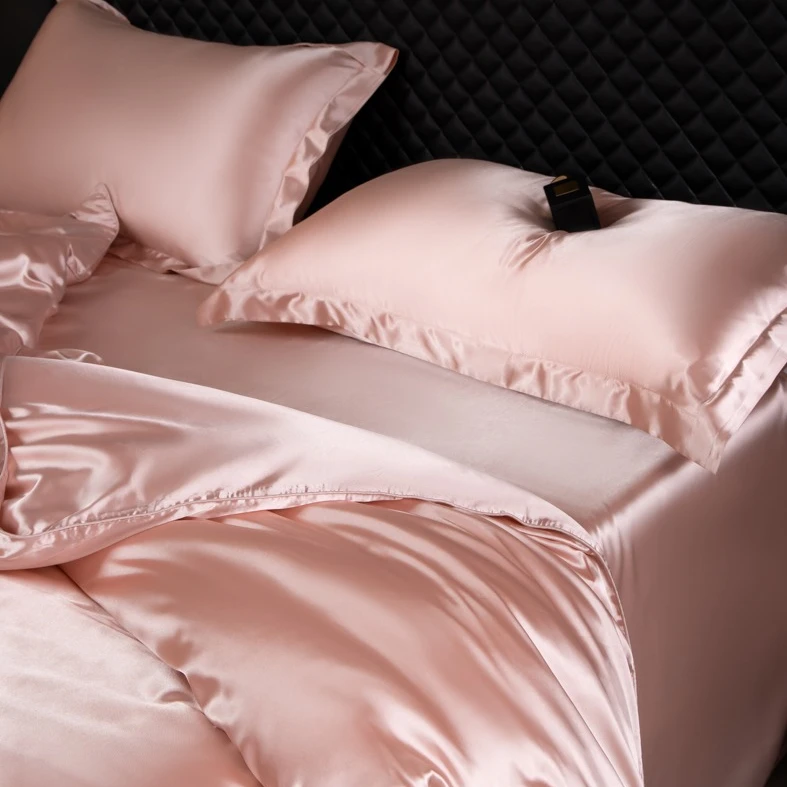
Frequently Asked Questions About Silk Sheet Quality
Is 19 momme silk good enough for everyday bedding?
Yes, 19 momme silk sheets are suitable for everyday use, especially for those who prefer a lighter feel or live in warmer climates. While not as durable as higher momme options, they offer authentic silk benefits at a more accessible price point. With proper care, 19 momme sheets can last 2-3 years with regular use.
How noticeable is the difference between 19 and 25 momme sheets?
The difference is quite noticeable, even to those new to silk bedding. A 25 momme sheet feels substantially heavier and more substantial against the skin, has better opacity (less see-through), and typically has a more pronounced drape. The 19 momme sheet will feel lighter, more breathable, and slightly less substantial. Most people can immediately feel the difference when handling both options.
Why are some silk sheets so much more expensive than others?
Price differences in silk sheets reflect several quality factors: momme weight (higher costs more), silk grade (6A commands premium prices), production methods (hand-processed silk costs more than machine-processed), and brand reputation. Genuine queen size silk sheets from reputable manufacturers cost more because they use higher quality raw materials and more silk per square yard of fabric.
Can you feel the difference in momme weight when sleeping?
Yes, most people can feel the difference when sleeping on different momme weights. Higher momme sheets (25+) feel more substantial and have a pronounced “weight” on the body. Mid-range options (22) offer a balanced feel, while lighter weights (19) provide a more delicate sensation. Your preference depends on whether you enjoy feeling the gentle weight of your bedding or prefer a lighter touch.
Do higher momme silk sheets require more specialized care?
Interestingly, higher momme silk sheets are often slightly more forgiving in terms of care because the increased silk density makes them more durable. While all silk requires gentle handling, 25+ momme sheets can better withstand machine washing on delicate cycles than their 19 momme counterparts, which may require hand washing to prevent damage.
How long should quality silk sheets last with proper care?
With appropriate care, quality silk sheets should last:
– 19 momme: 2-3 years with regular use
– 22 momme: 4-5 years with regular use
– 25+ momme: 5-7+ years or more
Proper care significantly extends lifespan. Many Sanctuary Soft customers report their higher momme king size silk sheets still looking beautiful after many years of use.
Are blended silk sheets worth considering?
Silk blends (typically silk mixed with cotton or synthetic fibers) offer increased durability and easier care at a lower price point, but they sacrifice many of silk’s natural benefits. They won’t provide the same temperature regulation, skin benefits, or luxurious feel as 100% silk. For those primarily seeking the health and comfort benefits of silk, pure silk sheets are the better investment despite the higher cost and more particular care requirements.
Making the Right Investment: Final Recommendations
After exploring the intricacies of silk sheet quality metrics, it’s clear that momme weight – not thread count – should be your primary consideration when investing in silk bedding. This weight-based measurement provides a reliable indicator of how much actual silk material is in your sheets, directly correlating with durability, feel, and performance.
For most consumers seeking the optimal balance between quality and value, 22 momme silk sheets represent an excellent middle ground. This weight provides substantial durability while maintaining the lightweight, breathable properties that make silk bedding so desirable. Those prioritizing maximum luxury and longevity might prefer 25-30 momme options, while budget-conscious shoppers can still enjoy authentic silk benefits with 19 momme sheets.
Remember that quality silk is an investment in your sleep environment that pays dividends night after night. The initial price difference between premium silk and lower-quality alternatives becomes less significant when you consider the extended lifespan of well-made silk sheets – especially those with appropriate momme weight.
As you shop for silk bedding, remain skeptical of marketing claims that emphasize thread count or use vague terminology about silk quality. Instead, look for clear specifications about momme weight, silk grade, and mulberry silk content to ensure you’re getting authentic quality.
For a comprehensive resource covering all aspects of silk bedding selection, our ultimate guide to silk bedding provides additional insights to help you make the most informed decision possible.

